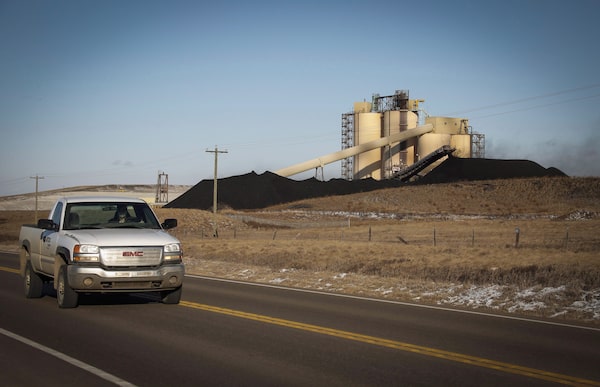
A conveyor belt transports coal near Hanna, Alta., on Dec. 13, 2016.Jeff McIntosh/The Canadian Press
In the wake of widespread public backlash and a legal challenge, the Alberta government has reinstated a restrictive 45-year-old coal mining policy ripped up by the province last year with no consultation. However, coal exploration that has already been granted regulatory approval will be allowed to continue.
The province faced intense public pressure after killing Alberta’s 1976 Coal Policy, which provided extra protections for sensitive lands and crucial headwaters on the eastern slopes of the Rocky Mountains.
Introduced under then-premier Peter Lougheed, the policy laid out how and where coal development could go ahead in the province. It banned open-pit mines over a large area by using land classifications, with completely or highly protected areas deemed Category 1 or 2 lands.
Those land classifications have now been reinstated, and new applications for coal exploration on Category 2 lands have been put on hold pending consultations with Albertans.
Energy Minister Sonya Savage has also directed the Alberta Energy Regulator to not permit mountaintop removal, a form of surface coal mining. Ms. Savage said “rigorous” consultations for a new coal policy will take place over the coming months.
“An important part of being a responsible government is to admit when you’ve made a mistake and to fix it, and that’s what we’re doing,” she said. “Keeping the 1976 Coal Policy in place and committing to consult on a modernized policy is what we should have done in the beginning. We didn’t do it then, but we’re going to do it now.”
Monday’s policy change marks a significant reversal for the Alberta’s United Conservative government, which in a May press release said that scrapping the 1976 policy was a “common-sense decision” that would “create certainty and flexibility for industry” and help attract investment. It argued at the time that it would put the acquisition of coal rights on equal footing with other commodities such as oil and gas and said regulatory reviews would protect sensitive land.
One company considering a new mine in the area applauded the government’s decision when it was announced in May.
Just last week Premier Jason Kenney told a Facebook live audience that the Coal Policy had been “superseded by far more stringent regulation of mining in general – coal mining in particular – through regulation and statute law since 1976.”
Hundreds of thousands of Albertans disagreed and signed petitions demanding the reinstatement of the 1976 Coal Policy, leading the government to cancel 11 leases signed in December by two mining companies.
But Southern Alberta ranchers and First Nations took the government to court, arguing the province had failed in its duty to consult before killing the policy.
One of those ranchers, Laura Laing, told The Globe and Mail Monday there’s no word yet on what the announcement means for the court challenge.
And while she feels encouraged by the government’s change of heart, she said “a lot of trust has been lost throughout this process.”
“What we most want to say is ‘thank you,’ and acknowledge the voices of all Albertans and Canadians for their fearlessness in defending the Rocky Mountains and these places. Without them, we wouldn’t have been hearing the minister’s announcement,” she said.
Applications for five new coal mines are currently before the Alberta Energy Regulator. All are in the exploration phase, which covers any work to determine the presence of coal by test drilling or anything that disturbs the surface. An application to expand the Vista Coalspur mine in the foothills near Hinton, west of Edmonton, is also before regulators.
Ms. Savage said exploration on four of the six projects began before the 1976 Coal Policy was rescinded, which means reimplementing the policy “won’t necessarily end exploration.”
Government officials said in a morning briefing the policy reversal would not affect mines such as the Grassy Mountain project, which is located in non-protected Category 4 lands in the Crowsnest Pass. It’s on the site of an old mine that closed in the 1960s and is set to produce about 93 million tonnes of metallurgical coal – used to make steel – over its 23-year life. It is owned by Riversdale Resources Ltd., a subsidiary of Australian mining giant Hancock Prospecting.
Still, Ms. Savage said her government “will not allow coal developments to jeopardize the mountains, headwaters, foothills, parks and the recreation areas that we cherish.”
Ian Urquhart, conservation director for the Alberta Wilderness Association, said Monday he was pleasantly surprised about Monday’s announcement. The association has been a vocal critic of the cancellation of the 1976 policy. Mr. Urquhart said he would like to see an expert review panel convened to develop Alberta’s new coal mining policy and, ultimately, more mining restrictions.
“For the very few number of jobs being generated through this, for the very little amount of money coming into the provincial treasury from this, do we really want to risk what metallurgical coal mining of any type in the Rockies and foothills could bring?” he said.
The Coal Association of Canada said it would not comment on Monday’s announcement until it has read the 1976 policy.
Your time is valuable. Have the Top Business Headlines newsletter conveniently delivered to your inbox in the morning or evening. Sign up today.